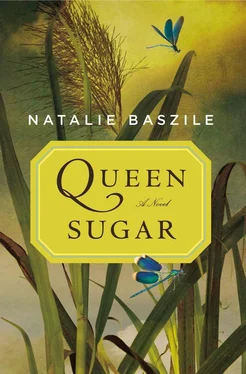Yesterday, they had cut the mother stalk and loaded it into the cane wagons. Now, as soon as Denton gave the signal, each tractor would pull a wagon through the fields slowly enough for the crews following behind to yank the mother stalks off the back and lay them in the open rows. Later, another tractor would come along and cover each row with dirt.
Between now and early September, Charley needed to clear and cultivate 25 percent of her land — rid it of the oldest cane stalks, which were no longer producing, and replant the same ground with mother stalk. In a few weeks, delicate shoots known as first-year stubble would sprout from knobs along the recently buried stalks, and twelve months from now, if all went well, she’d have a decent stand of new cane to harvest for the next four years. That’s how it went: 25 percent new cane, 75 percent existing. It was a constant cycle, one made even more unforgiving by the brutal August heat. Planting season was fleeting; and between the thunderstorms and the equipment breakdowns, Charley couldn’t stop for a minute if she wanted next year’s crop in the ground on schedule.
• • •
By six o’clock, it was light enough to start. The last tractor was hitched, the crews assigned. They were about to head toward the back section, now known as Micah’s Corner, when Romero, the most experienced of the Mexican laborers, told Charley one of his men was sick.
“Sick how?” Charley said, eyeing the thermometer she’d nailed to the shop door so she could warn the men when it got too hot to work. Last week she rushed a man with a core temperature of one hundred six to the clinic. Two more degrees, the doctor warned, he would have died.
“Fever,” Romero said. The brim of his hat flared wide as a whirling dervish’s skirt. “It’s no good, I know. But if he works today, he will maybe make the others sick too.”
“Shit,” Charley said, but Romero was right, of course. After all the trouble she’d gone through to get the men up here — the H-2 visas and the bus tickets from Guanajuato, the expense of fixing up the workers’ house behind the shop so they’d have a decent place to sleep — the last thing she could afford was for them all to get sick. “I’ll drive him to the clinic.” Charley dug in her pocket for her keys. She pulled a black man who went by Huey Boy off the crew and told him to drive the tractor, then radioed Denton and Alison, already on their way to Micah’s Corner, that she’d return soon as she could.
• • •
It was after eight by the time Charley got back from town. In halting high school Spanish and with a series of hand gestures, she explained the prescriptions to the sick worker, set a bottle of water by his bed, then headed for Micah’s Corner. When she’d first arrived in Saint Josephine, this quadrant was the worst section of her land — blackjack land, Denton had said, ominously — overgrown with weeds, johnsongrass, and useless fourth-year stubble, the rows crooked as witch’s fingers and so deeply rutted they were almost beyond repair. But since they’d cleared everything out and started over, the rows were straight and evenly spaced. Every time Denton pulled the cultivator through, he’d climbed down from his tractor, shaking his head in wonder, saying, “If I hadn’t seen it for myself, I wouldn’t believe it. Cutter goes through there like a wind song.”
Now, standing at the edge of those fields, under a sky that had already faded from blue to white in the rising heat, it was obvious what the morning’s delay had cost her crew. The goal was to plant five rows at a time with each man responsible for a row. But with four men, not five, behind the wagon, they hadn’t made much progress. The crew moved slowly, pulling cane stalks from the wagon with extra care to ensure each row was filled, but Charley saw gaps where there was still simply no cane at all. Those spaces would be empty once the cane grew, which meant a lower yield next year.
Without another thought, Charley ran out to the field. Huey Boy was doing a good job of driving, so instead of replacing him, she joined the crew, pulling armloads of cane stalks off the back of the wagon. The men looked at her as though she’d lost her mind, whispered in Spanish, but there was no time to explain. Piled ten feet high in the wagon, the cane was still heavy with dew. Leaves and dirt were mixed in with the stalks, as if an enormous hand had ripped a ton of cane from the earth and dropped it into the wagon. Which was pretty much the way it had happened: after Denton cut the cane yesterday, Alison had used the derrick, which looked to Charley like a gigantic claw, to scoop the cane off the ground and dump it into the wagon until it was close to overflowing.
Positioning herself behind the wagon, Charley was surprised to discover that the tractor bumped along at a steady clip, and it was all she could do to pull a few stalks off and lay them end to end before the tractor was out of reach and she had to run to keep up. As she worked, she thought of the rats, snakes, rabbits, even wild pigs that might, at that very moment, be buried in each scoop. Chances were they’d outrun the combine when it went through, or were sliced up as it passed, but who knew for sure? She’d heard stories of rats leaping out of the wagon, of men being bitten by snakes coiled among the stalks. Then there was the broken glass and the cane leaves with their razor-sharp edges. That was only the beginning. After just a few minutes, dirt had caked her arms, her watch, and the front of her jeans and had even sifted into her pockets, and she wondered if she’d ever be clean again.
Every few minutes, the men whistled to Huey Boy, who flipped a switch causing the hydraulic arm to shove cane from the front of the wagon to the back, closer to where Charley and the crew were pulling stalks. It felt to her that a tsunami of cane was coming at her. But there was no stopping. Each time the cane got low, the men whistled and more stalks got pushed back. At the end of the row, the tractor lumbered onto the headlands, moved five rows over, and the work began again. It was simple, mindless labor, but grueling and treacherous all the same. As the workers grabbed armloads of cane, the long stalks knocked Charley in the head before she learned she needed to duck. When the men dropped the cane in the rows, it landed on her feet and she stumbled. If she hadn’t known better, she’d have thought they were doing it on purpose. But there was no time to wonder. The cane wagon kept moving. Men kept whistling. The hydraulic arm kept shoving the cane to the back edge of the wagon, and Charley kept working.
The sun rose higher, the temperature leaped by ten degrees in the time it took to reach the side of the field where they’d started, and Charley’s clothes were drenched. One of the men stooped beneath the wagon, grabbed a metal cup from the hook, and held it beneath the watercooler strapped to the axle. When it was full, he offered it to Charley and she gulped it down, not caring that she’d heard members of the crew hack and cough and spit before drinking from that very cup. The water was sweet and cold and trickled down the front of her shirt.
Every few rows, Huey Boy shifted the tractor into neutral, climbed out of the cab, and scaled the plant wagon to check on their progress, his expression, as he looked down at Charley, a mixture of amusement and admiration. Charley imagined what he’d tell his buddies when he met them for a beer after work: that he was working for a crazy black woman from California who not only owned the land, but got behind the wagon and planted cane herself. Then Huey Boy climbed back inside the cab and Charley heard the faint beat of hip-hop over the engine’s rumble.
Finally, the wagon was empty. The men fell back. And as the tractor lurched away, the men gathered handfuls of leaves into small nests and sat down right in the middle of the field, cowboy hats shielding their faces from the sun, and Charley sat too, glad to watch the tractor roll down the headland and out of sight, grateful for the few minutes to rest. One man smoked, but the others took the opportunity to eat, ripping the outer husks off the cane stalks, gnawing at the sweet fibers, sucking and chewing, and finally spitting the pulpy wads in the dirt.
Читать дальше












